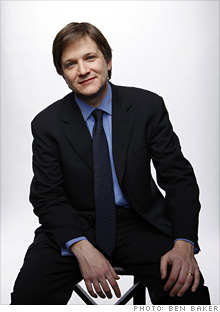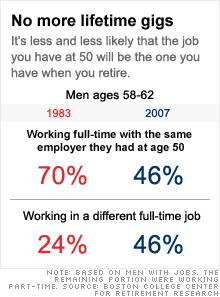Twentysomething 2.0: Rebooting your career
The recession has boomers and Gen Xers feeling uncertain about their future careers.


(Money Magazine) -- Recently my family and I wandered into an outdoor punk-rock festival in our neighborhood. I can't say I fit in. There's no way to look hard-core when you're trying to shoo your children away from the mosh pit.
But the (way too loud) music connected with me. This was the soundtrack of my own youth, and lately I've been feeling young again. And not completely in a good way.
Think back to your early twenties. Your future was a blur. You may have had only a sketchy idea of what you might end up doing for a living, and you weren't sure you'd be successful. For lots of boomers and Gen Xers, the recession has brought the old uncertainty roaring back. It's Twentysomething 2.0.
We already knew our jobs weren't lifetime deals (see the graphic). But now entire white-collar industries are shrinking or reorganizing: finance, marketing, media, real estate. We're realizing we may need to make a really big change.
The smart move would be to get past the fear and try to recapture the openness and energy of youth. It's not so simple. Our careers may once again be up in the air, but our obligations are nailed down. We have spouses, kids, and mortgages.
Employers don't see us as actual twentysomethings either. We want real paychecks, and we're actually going to use our health insurance. And as sociologist Richard Sennett has observed, we're not docile yes-men and -women. Today's flexibility-obsessed firms don't always appreciate that.
Our society isn't yet set up for people to go through startup mode twice, says Marc Freedman of Civic Ventures, a nonprofit dedicated to helping boomers move into "encore" careers in public service. It's still too hard for mid-career people to go back to school -- or to maintain health coverage between jobs.
Even financial planning needs a new approach: You may want to hold less in stocks in order to have liquid assets to tap during a career reboot.
Then there's the psychological challenge of shifting gears when your plans fall apart. One approach that helps, says Herminia Ibarra of the Insead business school: Don't assume that you'll quickly go from dead-end career A to dream job B. You'll have false starts and a long learning curve, and you may have to experiment with a few jobs, volunteering, or consulting gigs. You won't know what fits until you actually try new things. "People act their way into a new career," she says.
Getting back to punk ... It turns out the bassist of Hüsker Dü, one of my favorite '80s bands, now owns a restaurant in Minnesota. Greg Norton didn't transform overnight.
"After the band broke up, I was like, 'What do I do now?' " he says. He started working in kitchens, became a chef, and finally learned enough to open a place with his wife. To quote a Hüsker song I've had on heavy rotation: "Expectations only mean you really think you know what's coming next. And you don't."
Thinking of relocating to get a better job? Tell us your story. Please send an email with a brief description of your situation and a photo to Donna Rosato at donna_rosato@moneymail.com. For the CNNMoney.com Comment Policy, click here. ![]()


